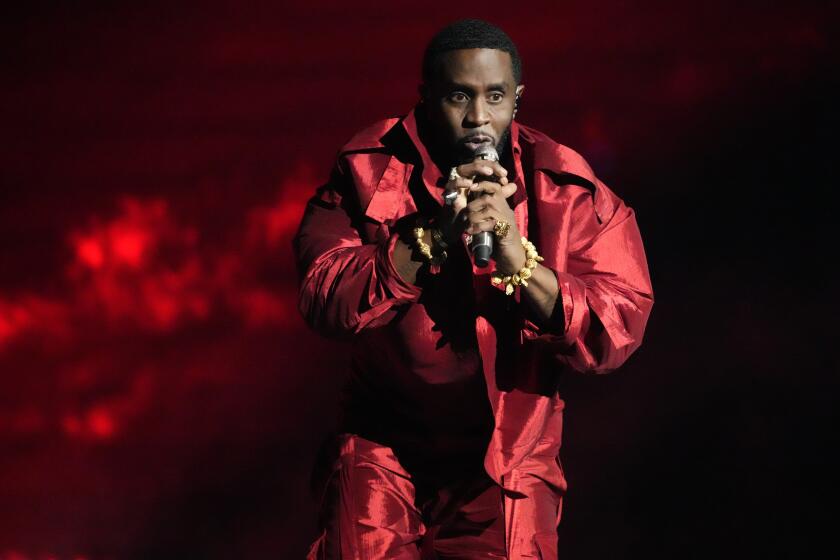Sean ‘Diddy’ Combs’ lawyers say his New York home would be ‘more restrictive’ than jail

For a third time, lawyers for Sean “Diddy” Combs urged a judge Friday to grant the hip-hop mogul $50 million bail, this time saying he should be placed in home confinement in a three-bedroom New York City apartment on the Upper East Side with 24-hour surveillance.
Federal prosecutors, however, said Combs violated the rules in a federal lockup and “cannot be trusted” outside with contacting witnesses. They also alleged that he was a “danger to others.”
U.S. District Judge Arun Subramanian delayed a decision until next week.
Combs’ legal team told the judge that it was proposing conditions “far more restrictive” than Combs faces in jail, including limiting phone calls to only his attorneys, prohibiting visitors other than a handful of lawyers and named family members, and requiring 24-hour security by an independent firm with a bar on contacting witnesses or potential witnesses. Previously, the defense had proposed Combs’ Miami mansion for home detention, but the judge rejected that Friday because it has a dock and access to the water.
Sean ‘Diddy’ Combs was arrested in New York after a grand jury indictment. Combs is facing multiple lawsuits and is the subject of a sweeping sex trafficking probe.
Combs, 55, has pleaded not guilty to charges of sex trafficking, racketeering and transportation to engage in prostitution. He and associates are accused of luring female victims, often under the pretense of a romantic relationship, and using force, threats, coercion and drugs to get them to engage in sex acts with male prostitutes in what Combs referred to as “freak-offs.” He has been in federal detention for more than 60 days since his arrest.
Federal prosecutors reiterated their opposition to Combs being granted bail, alleging that he attempted to tamper with witnesses and influence potential jurors.
Prosecutors said that in the Metropolitan Detention Center in Brooklyn where he is being held, Combs had flouted rules regarding communications and phones and was orchestrating contact with witnesses to buy himself out of the case with false testimony. The prosecutor said he was a “danger to others” who only needs to reach one juror.
The judge asked prosecutors to address why Abercrombie & Fitch CEO Michael Jeffries was able to get $10-million bail on an indictment for sex trafficking and prostitution business but not Combs.
Combs’s lawyers noted that Jeffries allegedly paid for dozens of men to travel within the United States and internationally to meet him and his co-defendants to engage in commercial sex acts. Jeffries is also accused of using a security company to surveil and intimidate witnesses who threatened to expose his misconduct, yet the government agreed to his home detention.
Federal prosecutors, however, argued in court and a two-page letter to the judge that the cases are materially different for multiple reasons. While Jeffries is accused of using force, fraud, and coercion to engage men in non-consensual sex, he is not facing the additional racketeering, firearms and violence-related charges that Combs is.
Combs is charged with leading an enterprise with a persistent pattern of racketeering activity from 2008 to 2024 that included Combs and his co-conspirators engaging in kidnapping, arson, and forced labor.
Combs’ alleged criminal conduct, a prosecutor told the judge, was more similar to high-profile sex-crime cases where defendants were kept in custody, as with NXIVM leader Keith Raniere, Larry Ray and R. Kelly.
Combs’ lawyers also argued that the government distorted the now-infamous security video of Combs assaulting then-girlfriend Cassandra “Cassie” Ventura at the Intercontinental Hotel in Los Angeles. A prosecutor said they used the version that was first shown on CNN because they didn’t want Combs or his attorneys to be able to identify the source of the video and retaliate.
The judge gave prosecutors and Combs’ attorneys until Monday to submit information about Combs’ communications from jail — a recent sticking point in the case — before he makes a bail decision.
More to Read
Sign up for Essential California
The most important California stories and recommendations in your inbox every morning.
You may occasionally receive promotional content from the Los Angeles Times.












